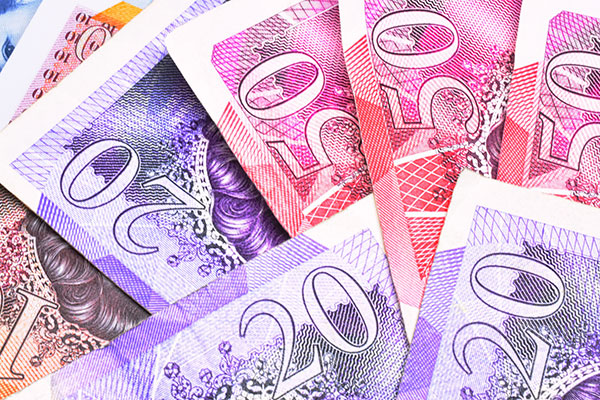Why I won’t be switching from investing to cash
Headline-grabbing rates mean cash has renewed appeal, but there are painful traps that can catch investors out if they’re not careful.
22nd January 2024 10:44
by Nina Kelly from interactive investor

Interest rates have remained at 5.25% since August. Some have suggested that the Bank of England could start to cut rates from as early as April or May. Hallelujah, shout variable rate mortgage holders and anyone whose fixed-rate deal is coming to an end – including me.
So, given that interest rates are now at their highest level since the financial crisis in 2008, cash savings accounts look tempting. Who doesn’t want to lock in a guaranteed5%-plus rate of return before the Bank starts to cut the base rate?
But while nothing is guaranteed in investing, I give reasons why switching wholesale to cash could be a financial banana skin.
- Invest with ii: Open an ISA | ISA Investment Ideas | ISA Offers & Cashback
First, everyone has a personal savings allowance, which allows you to earn interest before paying tax.
Rate of income tax | Personal Savings allowance (amount of interest that’s tax free) |
Basic rate 20% | £1,000 |
Higher rate 40% | £500 |
Additional rate 45% | £0 |
With interest rates on cash savings at the level they are now, you could easily exceed the personal savings allowance if you are hoarding a lot of cash. And who wants to give the taxman more of their money than they really need to?
Craig Rickman, interactive investor’s personal finance editor, explains that: “Given the top instant-access accounts currently offer around 5%, a basic-rate taxpayer could start paying income tax once savings exceed £20,000. This figure drops to around £10,000 for 40% taxpayers.”
If you do end up exceeding your personal savings allowance, and you are an employee or receive a pension, HMRC will change your tax code, so you pay the tax automatically. Ouch!
Putting your money into an ISA instead of stashing it in a savings account will keep it out of the taxman’s reach, and it remains easily accessible for whenever you need it. You can invest up to £20,000 each tax year in an ISA.
One way to avoid paying tax on your savings is to put a portion into NS&I Premium Bonds, where interest earned is tax-free. Part of Premium Bonds’ allure is your chance of winning £1 million in the monthly prize draw, but it’s very slim odds. Plus, the interest rate will fall to 4.40%from the March draw. You might conclude that you are better off investing your savings so that you have a chance of securing a better return.
Another issue with cash savings accounts is inflation. With the UK’s cost of living at 4% in December, you need to be earning at least that rate from a savings account just to preserve the value of your money, let alone grow your savings. While the rate of return on cash accounts may be favourable right now, we’re at a point in the economic cycle where the direction of interest rates is likely down.
- Six key questions as inflation creeps back up
- 2024 Investment outlook: share tips, forecasts, tax, pensions and savings
When interest rates fall, the cost of borrowing declines both for companies and consumers. This typically gives a boost to the economy and also share prices, especially for those companies investing heavily to grow.
Over the long term, greater returns are on offer if you invest the money in a stocks and shares ISA.
I’ve already talked about the double-digit return I earned on my stocks and shares ISA in 2023, and while that return wasn’t guaranteed and may not be repeated in 2024, there is the potential for me to enjoy a higher return.
But what about the risk of investing in the stock market? Risk is real, but it is very rare for someone to lose all their money if they have a diversified portfolio, or chosen a well-diversified investment, such as a multi-asset fund. If you’re investing for the long term, and especially if you’re making regular investments, time in the market has historically been a profitable strategy.
While I think investing trumps cash in almost every instance, the latter certainly has its place.
A cash fund for emergencies such as a broken boiler (a thought that makes me shudder as I write this in the bitter cold) is sensible, with most experts agreeing that three to six months’ income is a good buffer. As well as offering peace of mind, cash is also ideal if you have short-term goals, such as a holiday in three months’ time, or if you want to spend the money in, say, the next three years.
These articles are provided for information purposes only. Occasionally, an opinion about whether to buy or sell a specific investment may be provided by third parties. The content is not intended to be a personal recommendation to buy or sell any financial instrument or product, or to adopt any investment strategy as it is not provided based on an assessment of your investing knowledge and experience, your financial situation or your investment objectives. The value of your investments, and the income derived from them, may go down as well as up. You may not get back all the money that you invest. The investments referred to in this article may not be suitable for all investors, and if in doubt, an investor should seek advice from a qualified investment adviser.
Full performance can be found on the company or index summary page on the interactive investor website. Simply click on the company's or index name highlighted in the article.